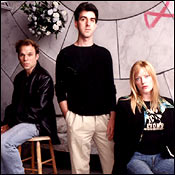
After its opening last year in a Chicago suburb, Jason Robert Brown’s funny, haunting chamber musical about a marriage gone sour moved Time magazine to name The Last Five Years one of the season’s best shows.
It also moved Brown’s ex-wife to have her lawyers inform Lincoln Center Theater, which was planning the New York premiere this spring, that she felt the show violated her separation agreement, in which Brown had promised not to call the musical a portrait of their relationship. The run was canceled, but in the ensuing months Brown rewrote one song, removed several identifying phrases, and made other changes – bringing us to the opening this week at the Minetta Lane Theatre amid rumors of peace between the litigants.
“I didn’t want to write a show that made anyone feel uncomfortable,” Brown says. “There’s a perception that the new musical theater is this heady pursuit and that we’re all icy intellectuals, when in truth none of us are. I did not pursue a career in academic composition. I wanted an emotional life – musical theater demands it.”
No one is going to be lobbing ice cubes at The Last Five Years. In a season of big shows, The Last Five Years is intimate, not to say familiar: Jewish boy gets Gentile girl, he finds success before she does, things fall apart. Her songs begin at the end of the tale and work back (think Merrily We Roll Along, Betrayal), while his start at the very beginning and go from there (think everything else).
Such affecting emotionalism may shock. However warm and fuzzy they may think they are, the cadre of post-Sondheim theater composers that includes Brown, Adam Guettel, and Michael John LaChiusa often seem to be writing in, or for, an alternate universe. Their subjects are too dark, their tunes too unhummable, their art – well, you know: Their art isn’t easy. And the mentor who led Brown to his Broadway debut and the 1999 Tony award for best score – before he’d hit 30 – was Hal Prince, the director whose career has been entwined with Sondheim’s forever. For all that, Brown’s Parade left audiences – critics, anyway, since few ticket buyers followed – cold; the Times called it a “civics lesson.”
The Last Five Years is no civics lesson. There are only two people onstage (Norbert Leo Butz and Sherie René Scott, pictured flanking Brown), but Daisy Prince – Hal’s daughter and a gifted director who has staked her own reputation on Brown – makes their world a warmly realized and accessible one.
These days, Brown pointedly prefers the word personal to autobiographical when talking about The Last Five Years. “I make mistakes all the time, and I’m still overwhelmed by not being able to fix something that’s the most important mistake of all,” he says of his own past five years. “Emotionally, that’s where a lot of the life of the piece comes from.
“I find the catharsis enjoyable,” he adds. “As Jews go, I’m the kosher ham.”